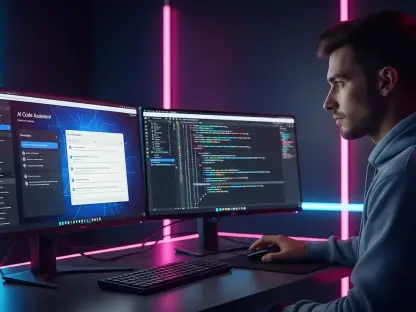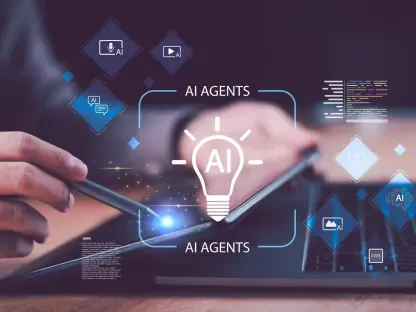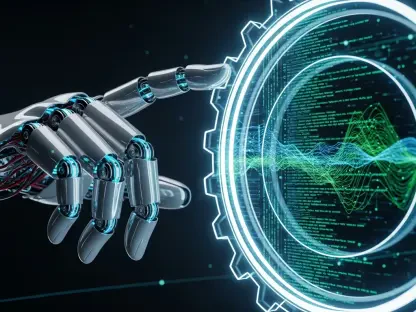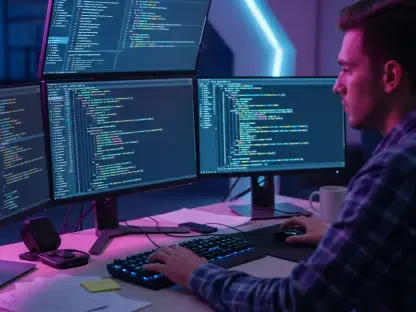In an era where digital transformation drives nearly every sector, a staggering shift is underway in software development: the rise of code generation technologies is slashing development timelines and costs, with some studies estimating a reduction of up to 40% in coding time through automation tools. This seismic change, propelled by generative AI models, challenges the very foundation of how software is created, valued, and maintained across industries. As developers pivot from relying on traditional libraries to crafting bespoke solutions in minutes, the economic and operational paradigms of the industry are being rewritten. This report delves into the transformative impact of these technologies, exploring their influence on market dynamics, developer roles, and the future of software itself.
Understanding the Software Development Landscape Today
The software development industry stands at a critical juncture, shaped by rapid advancements in automation and the integration of generative AI tools like Claude Sonnet and Claude Opus. These technologies are not mere accessories but central forces driving efficiency and innovation, enabling developers to produce tailored solutions at unprecedented speeds. With software underpinning global economies—from powering financial systems to enabling healthcare innovations—the stakes for adopting cutting-edge tools have never been higher, as businesses race to stay competitive in a digital-first world.
Key segments within the industry include proprietary software, open-source frameworks, and an expanding array of development tools, each influenced by the rise of AI-driven code generation. Major players span software vendors offering licensed products, open-source communities maintaining widely used libraries, and AI technology providers delivering next-generation solutions. This diverse ecosystem reflects a blend of competition and collaboration, where the balance between standardization and customization is increasingly tilting toward the latter as automation gains traction.
Technological influences extend beyond tools to disrupt traditional practices, with generative models reducing dependency on prebuilt libraries and accelerating project timelines. Meanwhile, regulatory frameworks such as data privacy laws and intellectual property rights play a significant role in shaping how AI-generated code is integrated into workflows. These regulations ensure accountability but also pose challenges for adoption, as companies navigate compliance while leveraging the benefits of automation in a rapidly evolving landscape.
The Rise of Code Generation: Trends and Market Insights
Key Trends Shaping Software Development
Generative AI and automation are at the forefront of reshaping software creation, enabling developers to build custom solutions with minimal reliance on standardized libraries. This shift empowers teams to address specific needs without the bloat of unused features often found in proprietary or open-source packages. As a result, the industry is witnessing a move away from one-size-fits-all approaches, with tailored implementations becoming the norm rather than the exception.
Developer behaviors are evolving in tandem, as the ease of code generation fosters a preference for bespoke solutions over traditional dependencies. Where once integrating a complex library was a time-saving necessity, today’s tools allow for lightweight, purpose-built alternatives to be crafted in hours. This trend not only streamlines development but also reduces the technical debt associated with maintaining external frameworks, signaling a cultural shift in how software is approached.
Market drivers such as cost efficiency and speed of development further fuel this transformation, while the democratization of coding skills opens doors for non-traditional developers to contribute. Opportunities abound for innovation, particularly in creating highly specialized software solutions that cater to niche demands. These dynamics underscore a broader push toward agility, where the ability to adapt quickly to unique requirements defines competitive advantage in the marketplace.
Market Data and Future Projections
Current performance indicators reveal a notable decline in sales of proprietary software licenses, as developers increasingly turn to AI tools integrated into their environments for custom code creation. Adoption rates of these technologies are climbing steadily, with many organizations reporting significant productivity gains. This shift reflects a growing recognition that the value of software lies less in prebuilt components and more in the ability to generate precise, efficient solutions on demand.
Looking ahead, forecasts suggest a surge in demand for developers skilled in leveraging AI tools, alongside a marked increase in custom software solutions over the next few years, from now through 2027. Industry adoption trends indicate that generative technologies will continue to penetrate development workflows, potentially reshaping entire categories of software tools. As these advancements mature, the focus will likely shift further toward automation-driven innovation, redefining benchmarks for speed and scalability in project delivery.
Challenges in the Era of Code Generation
The advent of code generation introduces a spectrum of challenges that span technological, market, and operational domains. On the technical front, ensuring the quality and security of AI-generated code remains a pressing concern, as does integrating these outputs with existing systems. Bugs or vulnerabilities in automated code can have cascading effects, necessitating rigorous validation processes to maintain trust and reliability in production environments.
Market-driven challenges are equally significant, with the diminishing economic moat of specialized libraries and frameworks impacting both vendors and open-source communities. As custom solutions become more accessible, the justification for investing in or maintaining complex dependencies weakens, pressuring traditional business models. This erosion of value challenges stakeholders to rethink how they deliver and monetize software in an increasingly automated landscape.
Operationally, the shift disrupts conventional roles such as software architects, whose expertise in designing systems is being supplemented by AI-driven proposals. This necessitates reskilling efforts to adapt to hybrid workflows where human oversight complements machine efficiency. Potential solutions include developing robust testing frameworks for AI outputs, fostering collaborative models between developers and automation tools, and updating training programs to equip teams with the skills needed to navigate this new terrain.
Regulatory Landscape and Compliance in Software Development
Navigating the regulatory environment is a critical aspect of integrating code generation into software development practices. Key laws like the General Data Protection Regulation (GDPR) impose strict requirements on data privacy, directly affecting how AI tools handle sensitive information during code creation. Similarly, copyright laws surrounding ownership of AI-generated code raise complex questions about intellectual property, compelling companies to establish clear guidelines for usage and attribution.
Compliance and security measures are paramount, as AI tools must adhere to established standards to prevent breaches or legal liabilities. Licensing requirements for generated code further complicate adoption, requiring transparency in how outputs are derived and utilized. Organizations must prioritize secure integration of these technologies, ensuring that automated processes align with industry benchmarks to mitigate risks associated with non-compliance.
The impact of regulations on industry practices is profound, influencing the pace and manner in which code generation technologies are embraced. These frameworks often demand greater accountability in AI outputs, pushing for documentation and traceability in development workflows. Balancing innovation with adherence to legal standards remains a delicate task, shaping how companies structure their adoption strategies to maintain both competitiveness and integrity.
Future Horizons: Where Code Generation is Leading Software Development
Emerging innovations in AI models promise to further automate entire software categories, such as utility libraries and build tools, potentially rendering traditional ecosystems obsolete. These advancements could enable end-to-end development processes driven by machine intelligence, from ideation to deployment. As capabilities expand, the line between human and automated contributions may blur, redefining the scope of what constitutes software creation.
Market disruptors are already evident, with the erosion of traditional software value chains giving way to on-demand, custom solutions. This shift challenges established vendors to pivot toward service-based or AI-enhanced offerings, while empowering smaller players to compete through agility. The reconfiguration of economic incentives signals a broader transformation, where adaptability and specificity become key drivers of success.
Consumer preferences are aligning with this trend, favoring tailored software over generic frameworks, while accessible AI tools expand developer communities globally. Growth areas include specialized applications catering to unique industry needs, supported by an influx of talent enabled by automation. Influencing factors such as global economic conditions, evolving regulations, and relentless technological innovation will continue to shape this trajectory, guiding the industry toward a future where customization and efficiency reign supreme.
Conclusion
Reflecting on the insights gathered, it becomes clear that code generation has fundamentally altered the software development landscape by diminishing the allure of proprietary and open-source dependencies while accelerating project cycles. This transformation has reshaped traditional roles, pushing teams to adapt to automation-driven paradigms. The industry has witnessed a profound shift in value perception, moving from reliance on frameworks to a focus on direct, tailored outcomes.
Looking ahead, stakeholders should prioritize investment in AI-driven development tools to stay ahead of the curve, ensuring that infrastructure supports seamless integration of generative technologies. Upskilling initiatives emerge as a critical step, equipping developers with expertise in hybrid workflows to maximize the potential of automation. Additionally, advocating for balanced regulatory frameworks proves essential, fostering innovation while safeguarding security and compliance in an ever-evolving digital ecosystem.









